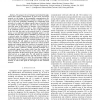Free Online Productivity Tools
i2Speak
i2Symbol
i2OCR
iTex2Img
iWeb2Print
iWeb2Shot
i2Type
iPdf2Split
iPdf2Merge
i2Bopomofo
i2Arabic
i2Style
i2Image
i2PDF
iLatex2Rtf
Sci2ools
119
click to vote
INFOCOM
2012
IEEE
2012
IEEE
Data gathering in networks of bacteria colonies: Collective sensing and relaying using molecular communication
Abstract—The prospect of new biological and industrial applications that require communication in micro-scale, encourages research on the design of bio-compatible communication networks using networking primitives already available in nature. One of the most promising candidates for constructing such networks is to adapt and engineer specific types of bacteria that are capable of sensing, actuation, and above all, communication with each other. In this paper, we describe a new architecture for networks of bacteria to form a data collecting network, as in traditional sensor networks. The key to this architecture is the fact that the node in the network itself is a bacterial colony; as an individual bacterium (biological agent) is a tiny unreliable element with limited capabilities. We describe such a network under two different scenarios. We study the data gathering (sensing and multihop communication) scenario as in sensor networks followed by the consensus problem in a multinode ne...
| Added | 28 Sep 2012 |
| Updated | 28 Sep 2012 |
| Type | Journal |
| Year | 2012 |
| Where | INFOCOM |
| Authors | Arash Einolghozati, Mohsen Sardari, Ahmad Beirami, Faramarz Fekri |
Comments (0)

